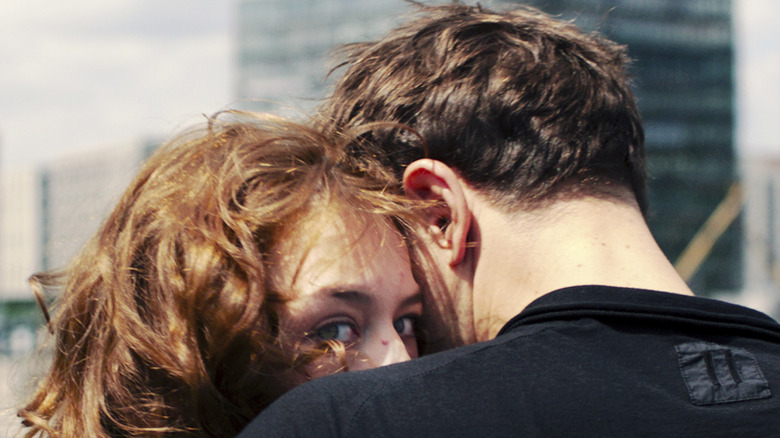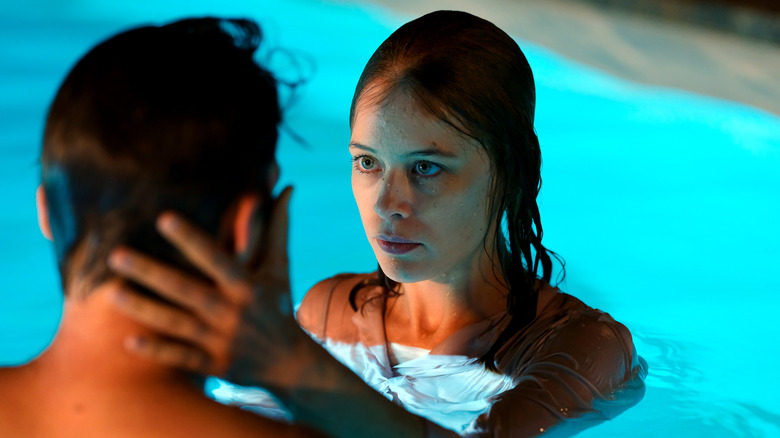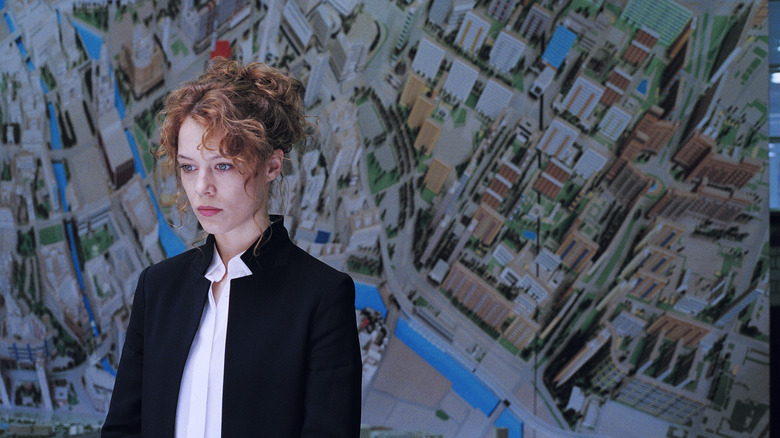Undine Review: Mermaids Need Love, Too
From the opening moments of "Undine," filmmaker Christian Petzold makes it clear he has no intention of ... making anything clear. The film opens with its title character (played by Paula Beer) being awkwardly dumped by her boyfriend Johannes (Jacob Matschenz), a man who seems nervous but strangely blithe considering the task at hand. Undine's incredulity immediately gives way to malice, reminding her soon-to-be-former flame that if he really commits to this decision, she's going to have to kill him. Intense and toxic attachment style much?
But this isn't a "Fatal Attraction"-type deal. Undine isn't just a spurned lover driven to rage at this conscious uncoupling. Rather, she is, perhaps, an ancient and unknowable aquatic elemental transformed into human form by Johannes' love, who now — having that romantic pact shattered — must murder him or return to the sea.
Maybe.
See, the film's title, as with Neil Jordan's 2009 Colin Farrell vehicle "Ondine," makes obvious reference to the old myth of water nymphs whose influence can be felt in a myriad of modern stories, Disney's "The Little Mermaid" among them. But instead of exploring the supernatural side of this narrative or being straight with the viewer about the rules and cosmology of its main character's whole shtick, Petzold chooses instead to focus on the emotional side of Undine's story, as she immediately meets a new suitor in the form of industrial diver Christoph (Franz Rogoski). Petzold is more concerned with exploring less corporeal concerns than spelling out for the viewer the fairytale side of this curious entanglement. Well, that and repeated diversions into long conversations about German architecture that call to mind Kogonoda's 2017 feature debut "Columbus."
For a filmmaker who has always balanced a sharp, economical focus with artfully excavating deep reservoirs of feeling, "Undine" winds up weirdly disjointed for a picture that is, nonetheless, still incredibly impactful. The act of deconstructing a well-worn myth has long been a fertile playground for filmmakers, but with "Undine" it's hard to shake the feeling Petzold could have colored inside the lines a little better.
I guess you moved on really easily...
Though the details and regulations of an oceanic nymph living among bipedal organisms never get ironed out, Petzold still finds lyrical ways to intimate to the viewer what kind of otherworldly chicanery is afoot. When Undine meets Christoph for the first time, in a cafe near her day job as an urban historian, the entire warped meet-cute is filled with strange portent. A large aquarium behind them housing a figurine of a fully suited diver becomes a foreboding sight, especially when it shatters, dousing the duo in a hypnotic moment of instant connection.
It's a powerful meeting to behold. The chemistry between Beer and Rogowski (previously paired together in Petzold's last film, "Transit") is palpable enough to make the viewer forget about the pressing conundrum from the film's opening scene. Where Johannes seemed aloof and detached, either unaware of the complexities of his supernatural bond with Undine or just that careless, Christoph is doting, obsessive, and more than a little clingy.
There's a scene when Undine takes the train to meet him and he runs the length of the platform, moving fast enough to stay in frame and in view through the car window. It's a charming distillation of how severe their bond has become in very little time. His devotion even makes Petzold's decision to show Undine at work so much pay more narrative dividends.
Through the film, we see her lecture tours delving into the history of Berlin, its architecture and its many changes through the twentieth century. Beer is captivating in these moments, her passion for and enchantment with this city intoxicating. But they feel tacked onto the story in a less than shrewd way at odds with Petzold's usual style.
His films have always blended the personal with the trappings of genre effortlessly. "Jerichow" captures the spirit of film noir while artfully detaching it from its well-worn aesthetic. "Phoenix" melds the Hitchcockian influence of "Vertigo" to post-war cinema in unique and compelling fashion. But "Undine" feels like a dressing whose disparate ingredients weren't given the proper care to emulsify. The viewer can draw interesting parallels from Undine's journey and that of the city she expounds upon, but those connections lack the cohesion of his other work.
It's not until a touching sequence in the middle of the film where Undine has to cram to write a lecture for the next day, covering for a sick colleague, that the side quests into architectural navel-gazing feel whole. As we sit and watch Christoph dote on her every word, enraptured by Undine the same way she's taken with the city and its foundations, we can finally feel a connection between the film's two diverging halves rather than just awkwardly trying to conjoin them like ill-fitting puzzle pieces.
Don't be so damn literal!
But that seeming bliss isn't meant to last. Everything we've put to the back of our minds from the opening comes rushing back to the present when Johannes returns and wants back into Undine's life. She has to make a decision about how to reckon with her past so she may have some kind of future.
It is at this juncture of the film that a series of events begin to unfold that are difficult to explain through hard logic. Anyone watching and wanting a more concrete understanding of the film's fairytale underpinnings will just drive themselves up a wall trying to unpack the tragic complications at the heart of this unfortunate love triangle. Luckily, that's not really the way to watch "Undine."
Even though there are a lot of ideas in this film that don't always come together as effectively as they do elsewhere in Petzold's filmography, it's no less enthralling for its muddiness. More sparse than other Petzold efforts, more minimal in its scope, "Undine" possesses such a potent sense of romanticism that it cannot be denied. Beer and Rogowski are absolute magic together and their mutual yearning, coupled with Petzold's inventive storytelling, transforms the film's modest environs into something more beguiling than another, more grandiose take on the material might aim for.
A more fantastical film might also be more sensical. It also might be easier to sew up by its conclusion with a comforting bow. But if you can rest your eyes a little and not try so hard to fit the entire picture into the frame of your mind at once, "Undine" is a movie that will reward you for your patience. If you can overlook its nebulous mythology, there's a truly stirring little movie swimming under the surface.
How many other movies this year are going to make you tear up watching a handsome man listen to a beautiful woman talk about urban development? Petzold doesn't miss.


